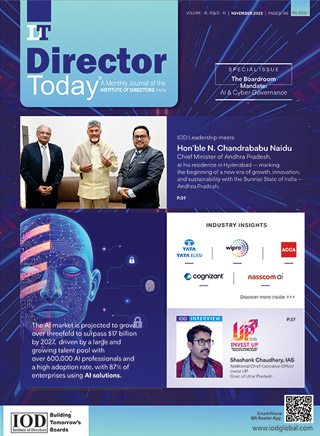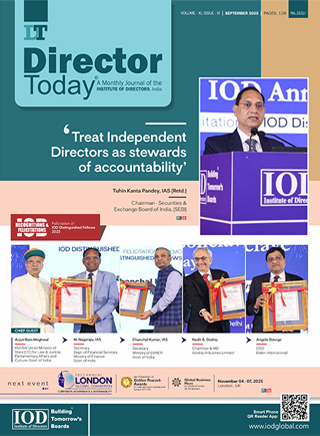Ethics & Technology: The New Frontier of Responsible Board Governance

As emerging technologies increasingly shape our interactions and daily lives, business leaders hold a growing responsibility to ensure that organisations are focusing on ethical practice in creating, deploying, and evaluating artificial intelligence (AI) and related tools. In parallel, many companies continue to separate their Corporate Social Responsibility (CSR) from their primary technological strategies, creating a rift at a time when greater integration and strategic alignment are becoming imperative. Boards must bridge this divide and guide organisations to ethically wield technology for the benefit of all. The world requires a new model of CSR where boards consciously advance technological capabilities for the benefit of all stakeholders and ensure that the organisations they advise are prepared for this iteration of the technological revolution.
In this article, we briefly review CSR’s evolution and introduce guidelines to reshape board leadership in the era of AI and emerging technologies. This exploration equips board directors with historical context and fosters an innovative environment that drives specific, actionable next steps and priorities. Embracing these updated roles can usher businesses into a future rich with opportunity and also emphasise corporate commitments to responsible business practices.
Corporate Social Responsibility: Tensions at the Frontlines of Profit and Purpose
Corporate Social Responsibility (CSR) in its most ideal form represents a shared commitment by organisations to balance profit-seeking activities with positive social impact. A broad review of the past decade of CSR efforts validates that these tactics can often provide positive financial, strategic, and reputational impact for businesses. CSR encompasses corporate philanthropy, community volunteering, socially responsible business practices, social marketing to change behaviours, and cause promotions or activism. It often focuses on employee wellbeing, supporting local or marginalised communities, or sustainable environmental practices.
CSR is also increasingly mainstream – and expected. In August 2019, 181 CEOs signed the Business Roundtable Statement on the purpose of a corporation, declaring that corporations’ value creation responsibilities extended beyond the maximisation of profits. According to an annual CSR insights study, consumers also increasingly expect companies to engage in CSR activities to benefit the communities in which they operate. A recent study by the World Economic Forum and Boston Consulting Group found that 67% of millennials both “expect employers to have purpose” and want their day jobs to create societal impact.
Despite these indications of positive enterprise effects, companies deploying emerging technologies are often caught in the tension between progressive mission statements and CSR initiatives and the stakeholder commitments evident in their core business strategies, which often prioritise profit over consideration of social implications. Boards must take a leadership role in ensuring the company’s reputation does not suffer due to a disconnect between the CSR and strategy teams.
The disconnect: CSR and Business Decisions about Technology
Many companies deploying emerging technologies express socially positive intent, including increasing connection and building community (Meta), “accelerating the transition to sustainable energy” (Tesla) or making the world’s information “universally accessible and useful” (Google). Some have invested heavily in CSR. For example, Google has long championed environmental causes – it has been carbon neutral since 2007, pursues energy and waste efficiency in its data centers, and powers its global business operations with renewable energy. It even helps its users to be more sustainable, providing carbon emissions and fuel-efficient routing in its available services. Also committed to a responsible agenda, Microsoft has devoted resources to increasing digital skills and broadband access to drive inclusive economic growth in underrepresented populations, as well as to be carbon negative by 2030. Apple committed to an ambitious agenda to permanently remove carbon from the atmosphere through its reforestation efforts, and has already launched carbon neutral products.
Despite these good intentions, public trust in technology companies to make responsible decisions continues to erode. The public perception that companies might prioritise the possible and profitable above the socially desirable reflects a deep concern that companies might push or ignore the boundaries of ethical technology use. Google itself removed the founders’ “don’t be evil” edict from its employee code of conduct in 2018. Its plans for a censored Chinese search engine and a Pentagon AI drone programme were stopped only when employees pushed back. Meta, besides selling user data to third parties, has capitalised on a lucrative political advertising system despite multiple scandals and its documented undermining of election results. Amazon’s advances into police and home surveillance via Ring and Alexa, respectively, as well as its increasingly predatory uses of consumer data, have alarmed privacy and human rights advocates.
When CSR and ethical principles are not part of corporate decision-making, dystopian outcomes with tragic consequences have emerged, demonstrating the critical need to advance board and executive skill sets in evaluating new activities. These activities create material corporate risk for board members while harming communities and destroying trust. A few examples from the past few years:
- Autonomous and automated vehicles killing drivers and a pedestrian
- Machine learning and AI more precisely targeting credit to those with limited ability to repay
- Digital identities used to track political dissidents
- Routine algorithmic bias in consumer technologies producing systemic job and financial discrimination
- Facial recognition technology used to identify and monitor – and in some cases – misidentify and violate
- Exacerbated polarization and overt political manipulation
- Emergence of deep fake videos to mislead voters in democratic elections
Companies with clear, compelling messaging on their commitment to positive intent have been participants in developing technologies that have led to direct conflict with their stated social mission. The ever-increasing pace and sophistication of technological innovation will only exacerbate and accelerate these instances. AI applications are exploding in capability and reach, already impacting every area of our lives. Clearly, both society and companies themselves must understand how technology drives social good or harm.
Next Steps: Towards CSR for the AI Age
How can companies unlock technology’s vast upside while limiting its damage? Boards and CEOs must reframe how they envision, develop, and deploy technologies, fully understanding their potential to impact millions of lives and our social fabric. Companies willing to place CSR at the forefront of their technology development, marketing, and business models can reap many benefits, including better talent, new products and markets, and supercharged R&D. What was once a “nice to have” is now a strategic imperative.
The introduction of new technology will inevitably raise ethical concerns and require new modes of working. Boards can take the following precautions to ensure compliance:
- Create pathways to identify and address ethical concerns. These policies should be designed to mitigate risks but also create a forum for individuals with ethical concerns to come forward. This pathway may require direct interaction with the board.
- Build expertise and policy. A leading, trusted voice is crucial to managing tech- and AI-related ethical risk, and a designated leader should be appointed. A board policy on risk should be created and agreed to, if one does not already exist.
- Consider obligations to regulators. Boards are responsible for ensuring organisational compliance with relevant laws and statutes, as well as monitoring new legislation. Boards must ensure they have a comprehensive understanding of the relevant laws of the jurisdictions in which they and their customers operate.
- Develop an oversight committee. This group’s mandate should be to review and advise on the use of technology within the organisation.
- Invite expert voices into the conversation. Especially if the board is not composed of technical experts, outside expertise can be critical for understanding threats and opportunities.
Boards can also advise executives to take the following steps to reduce risk and broaden tech-enabled opportunities:
- Employ ethical principles of design. Start with the Centre for Humane Technology’s Ethical Principles of Design. They are grounded in the recognition that technology is never neutral—we are continuously creating our social world—and the vulnerable human brain should be safeguarded, not exploited. The principles sound simple, but they fundamentally challenge the tech industry’s current assumptions and drivers:
(a) Obsess over values, not engagement metrics.
(b) Strengthen existing brilliance; more technology is not always the answer.
(c) Make the invisible visceral, especially when modelling potential harm.
(d) Enable wise choices, not just more choices.
(e) Nurture mindfulness instead of vying for attention.
(f) Bind growth with responsibility instead of simply maximising growth.
- Adopt broadly inclusive design processes. Invite potential customers and civil society wholeheartedly into the design process. Include a thorough evaluation of potential unintended consequences. Historically, companies have made these moves only in response to consumer pressure or lawsuits (e.g. Uber / Lyft on accessibility for people with mobility challenges / pushing Apple to create the hijabi emoji). Design Thinking offers what IDEO’s Tim Brown calls one “human-centered approach to innovation that draws from the designer’s toolkit to integrate the needs of people, the possibilities of technology, and the requirements for business success.”
- Institutionalise and empower socially responsible decision making. Beyond compliance, build talent and institutional structures that emphasise best practices in data management and thinking through implications. Their authority and responsibilities must reach throughout the organisation, comparable to oil companies’ Health, Safety and Environment function, or the Risk Management function at financial institutions. Consider roles like the Chief Ethics Officer at Salesforce, or corporate Philosophers, as championed by the Berggruen Institute.
- Embrace external accountability. Industry must join with civil society to set standards for socially responsible technology development and use. Create a new, independent standards organisation. Build internal business functions and external regulatory structures to monitor the evolution of technology, social impact, and power dynamics.
As we witness the accelerating pace of implementation of generative AI, machine learning, and eventually synthetic biology and quantum computing, it is rapidly becoming evident that society is not merely interacting with technological advancements; it is being profoundly shaped by them.
In modern businesses, board directors play a pivotal role, reaching beyond traditional oversight and requiring a long-term commitment to equity. By championing responsible technological decisions, they serve as models for more robust corporate governance, not only elevating their own company’s standing in the market but also establishing new standards for the intersection of corporate responsibility and technology. We’re already seeing promising examples of leadership in this area, both in board training initiatives and in practice. The National Association of Corporate Directors (NACD), which prides itself on modelling strong corporate governance, has seen a high rate of engagement on topics of CSR and technology, demonstrating a trend towards heightened focus on the intersection. In the marketplace, Meta has implemented an Oversight Board, to which individuals can appeal decisions made by the tech company on issues related to free expression on their platforms. The Oversight Board consists of external parties committed to offering a fair appeals process and increasing transparency across decision-making and norm-setting.
As representatives of stakeholder communities and key decision-makers about business longevity, board directors bear a significant responsibility in this era of transformation. To properly serve this responsibility, board directors must continuously educate themselves, ensuring they grasp the far-reaching implications of technology decisions, mitigate potential harms and vulnerabilities, engage in conversations about governance and ethical practice, and centre opportunities to create more trust-based engagement with all stakeholders. Businesses engaging in these decisions must operate with enhanced transparency, consistently aligning their actions with core values.
This work isn’t merely about risk mitigation or reputation management, but about demonstrating that profitability and principled decision-making can and should be 2 sides of the same coin. While the recommendations presented here offer a foundational roadmap, board directors and corporate leaders must act with curiosity and conviction and bring discernment and foresight to complicated conversations. With a commitment to responsible reflection and decision-making, boards can leverage technology for the benefit of not just the bottom line but humanity at large.
Author

Mr. Vilas Dhar
He is the leading global voice on equity in a tech-enabled world and serves as President and Trustee of the Patrick J. McGovern Foundation, a 21st century $1.5 billion philanthropy advancing AI and data solutions to create a thriving, equitable and sustainable future for all.
Owned by: Institute of Directors, India
Disclaimer: The opinions expressed in the articles/ stories are the personal opinions of the author. IOD/ Editor is not responsible for the accuracy, completeness, suitability, or validity of any information in those articles. The information, facts or opinions expressed in the articles/ speeches do not reflect the views of IOD/ Editor and IOD/ Editor does not assume any responsibility or liability for the same.

 Quick Links
Quick Links
 Connect us
Connect us




 Back to Home
Back to Home































